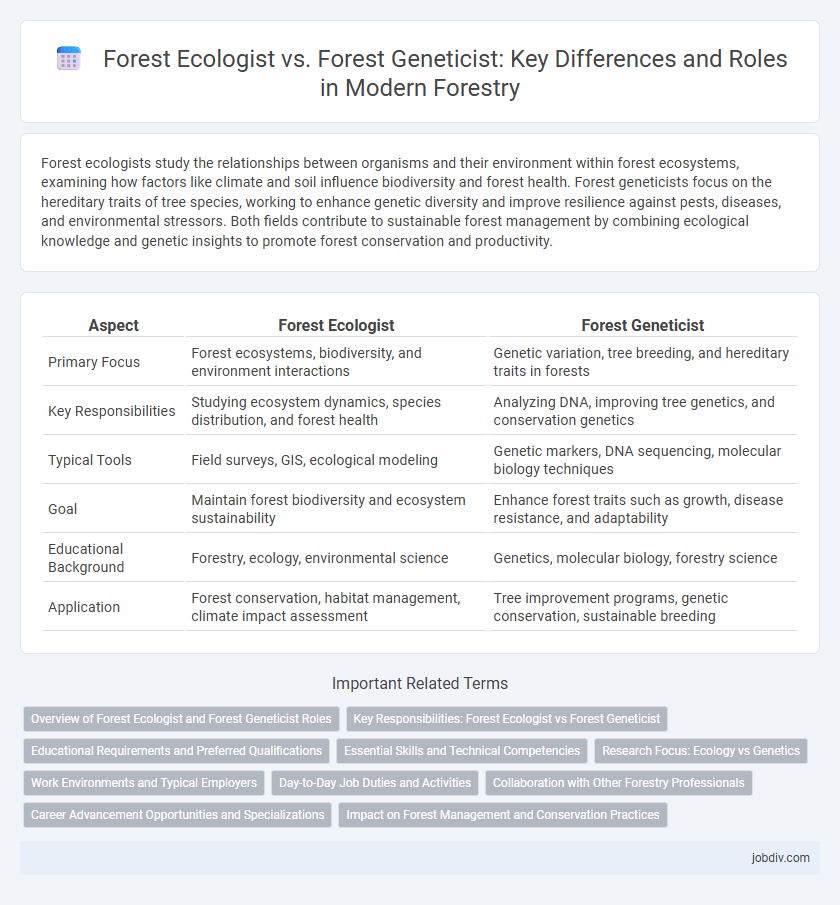Forest ecologists study the relationships between organisms and their environment within forest ecosystems, examining how factors like climate and soil influence biodiversity and forest health. Forest geneticists focus on the hereditary traits of tree species, working to enhance genetic diversity and improve resilience against pests, diseases, and environmental stressors. Both fields contribute to sustainable forest management by combining ecological knowledge and genetic insights to promote forest conservation and productivity.
Table of Comparison
| Aspect | Forest Ecologist | Forest Geneticist |
|---|---|---|
| Primary Focus | Forest ecosystems, biodiversity, and environment interactions | Genetic variation, tree breeding, and hereditary traits in forests |
| Key Responsibilities | Studying ecosystem dynamics, species distribution, and forest health | Analyzing DNA, improving tree genetics, and conservation genetics |
| Typical Tools | Field surveys, GIS, ecological modeling | Genetic markers, DNA sequencing, molecular biology techniques |
| Goal | Maintain forest biodiversity and ecosystem sustainability | Enhance forest traits such as growth, disease resistance, and adaptability |
| Educational Background | Forestry, ecology, environmental science | Genetics, molecular biology, forestry science |
| Application | Forest conservation, habitat management, climate impact assessment | Tree improvement programs, genetic conservation, sustainable breeding |
Overview of Forest Ecologist and Forest Geneticist Roles
Forest ecologists study the relationships between forest organisms and their environment, analyzing ecosystem dynamics, biodiversity, and the impact of climate change on forest health. Forest geneticists focus on the genetic variation within tree populations, using molecular tools to improve tree breeding, conservation, and adaptation to environmental stresses. Both roles contribute to sustainable forest management but emphasize different aspects: ecological interactions for forest ecologists and genetic improvement for forest geneticists.
Key Responsibilities: Forest Ecologist vs Forest Geneticist
Forest ecologists primarily study the relationships between forest organisms and their environments, focusing on ecosystem dynamics, biodiversity, and the impact of environmental changes on forest health. Forest geneticists concentrate on the genetic variation within tree populations, aiming to improve traits such as growth, disease resistance, and adaptability through selective breeding and genetic research. Both professions contribute to sustainable forest management but differ significantly in their approaches to conserving and enhancing forest resources.
Educational Requirements and Preferred Qualifications
Forest ecologists typically hold degrees in ecology, environmental science, or forestry, with advanced education such as a master's or Ph.D. preferred for research positions. Forest geneticists require specialized training in genetics, biotechnology, or plant science, often complemented by graduate studies focusing on genetic improvement and conservation. Both roles value experience in fieldwork and data analysis, but forest geneticists prioritize skills in molecular techniques and genetic mapping.
Essential Skills and Technical Competencies
Forest ecologists possess essential skills in ecosystem analysis, biodiversity assessment, and habitat restoration, enabling them to study forest dynamics and interactions among species. Forest geneticists demonstrate technical competencies in molecular biology, genetic mapping, and tree breeding techniques to enhance forest resilience and adaptability. Both roles require proficiency in data collection, statistical analysis, and geographic information systems (GIS) to support sustainable forest management.
Research Focus: Ecology vs Genetics
Forest ecologists primarily study the interactions between forest organisms and their environment, analyzing ecosystem dynamics, biodiversity, and the effects of climate change on forest health. Forest geneticists concentrate on the hereditary traits of tree populations, investigating genetic variation, gene flow, and the development of disease-resistant or climate-adapted tree species. Research in forest ecology emphasizes ecosystem processes and species interrelationships, while forest genetics focuses on molecular biology and genetic improvement for sustainable forestry management.
Work Environments and Typical Employers
Forest ecologists primarily work in natural forest settings, research institutions, and government agencies focused on ecosystem management and conservation. Forest geneticists are often employed by forestry research centers, tree improvement programs, seed banks, and universities conducting genetic diversity and breeding studies. Both professions may collaborate with environmental organizations, timber companies, and public land management agencies to support sustainable forestry practices.
Day-to-Day Job Duties and Activities
Forest ecologists study interactions between forest organisms and their environment, conducting field surveys to assess forest health, biodiversity, and ecosystem dynamics. They analyze soil, water, and wildlife data to develop conservation strategies and monitor the impacts of climate change on forest ecosystems. Forest geneticists focus on tree genetics, performing genetic sampling and analysis to improve tree breeding, disease resistance, and adaptability, often collaborating with nurseries to propagate genetically superior seedlings.
Collaboration with Other Forestry Professionals
Forest ecologists collaborate closely with forest geneticists to integrate ecological data with genetic diversity insights, enhancing forest management and conservation strategies. They share field observations on ecosystem dynamics, while geneticists provide critical information on species adaptation and resilience through genetic variation studies. This collaboration enables a comprehensive approach to maintaining forest health, biodiversity, and sustainability in response to environmental changes.
Career Advancement Opportunities and Specializations
Forest ecologists specialize in understanding ecosystem dynamics, biodiversity, and the impact of environmental changes, offering career advancement through research leadership and ecosystem management roles. Forest geneticists focus on genetic variation, tree breeding, and conservation genetics, with specialization opportunities in molecular biology, biotechnology, and genetic resource assessment. Both careers provide advancement paths in academia, government agencies, and private sector industries focused on sustainable forest management and conservation.
Impact on Forest Management and Conservation Practices
Forest ecologists analyze ecosystem dynamics, species interactions, and environmental factors to guide sustainable forest management and promote biodiversity conservation. Forest geneticists study genetic variation within tree populations to enhance adaptive traits, improve resilience to pests and climate change, and support restoration programs. Integrating ecological insights with genetic data optimizes conservation strategies and ensures long-term forest health and productivity.
Forest Ecologist vs Forest Geneticist Infographic

 jobdiv.com
jobdiv.com